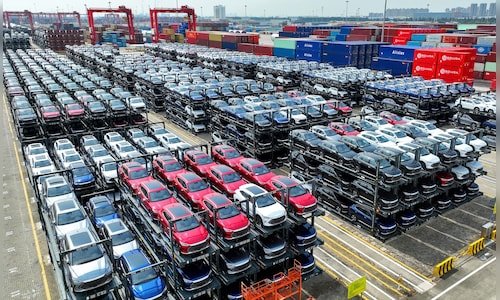Trump spoke Thursday at a signing ceremony for legislation terminating California regulations that would have banned the sale of gasoline-powered cars in 2035 — a long-sought victory for some carmakers and oil companies that attacked the rules as unachievable.
The president said raising auto tariffs from their current 25% level could offer further protection for the domestic auto industry, citing General Motors Co.’s plan to invest $4 billion in US plants over the next two years in order to avoid paying duties.
“I might go up with that tariff in the not too distant future. The higher you go, the more likely it is they build a plant here,” the president said.
Shares of GM, Ford Motor Co. and Jeep-maker Stellantis NV touched session lows as Trump spoke at the White House.
The president’s latest threat comes more than a week after he doubled steel and aluminum tariffs to 50%, and as he faces negotiations with dozens of trading before his July 9 deadline for higher duties to take effect.
Nations, including Japan and Germany, have sought in negotiations to find a way Trump’s auto levies, which threaten to batter vital industries.
The measures signed Thursday in the East Room of the White House revoke California clean air policies, including requirements that carmakers sell electric vehicles in greater numbers each year in the state.
“We officially rescue the US auto industry from destruction by terminating California electric-vehicle mandate once and for all,” Trump said. “They said it couldn’t be done, but boy it’s had us tied up in knots for years.”
The resolutions Trump signed Thursday repeal waivers granted under former President Joe Biden allowing California to set automobile pollution standards that are more stringent than federal requirements.
That power — enshrined in the Clean Air Act of 1970 — has helped the nation’s most populous state emerge as a global leader in setting industry-shifting clean-air and and climate policies.
Among the programs effectively voided by Trump on Thursday is a California initiative that compelled the sale of zero-emission vehicles over the next decade, ultimately banning the sale of conventional, gas-powered cars in 2035.
Trump applauded Congress for moving to strike the measures, saying it would prove longer lasting than if he acted on his own.
“I was going to sign a executive order and give it a shot. But the one good thing with this, number one, it holds up forever,” the president said
Environmentalists have decried Trump’s vows to unwind rules to spur EV sales — a fixture of his reelection campaign — as an assault on essential protections to help avert the worst effects of climate change.
“The Trump administration’s attack on clean air and clean vehicles only benefits the fossil fuel industry, leaving Americans to foot the bill with higher fueling costs, limited vehicle choices, and more pollution,” Sierra Club Clean Transportation for All Director Katherine García said in a statement.
The California requirements drew opposition from automakers, which have advocated for uniform standards that apply nationwide.
They’ve also drawn challenges from oil refiners and biofuel producers that have argued California was being given outsize power to effectively mandate electric vehicles even beyond its borders. Under the Clean Air Act, the California requirements apply in other states that adopt to follow them.
The US Department of Transportation has separately signaled it plans to roll back Biden-era fuel efficiency rules that would require automakers reach a fleet average about 50 miles-per-gallon by 2031.
Toyota Motor Corp. applauded the move to unwind California’s “unrealistic battery electric vehicle mandate.” A “consumer-driven market with one national emissions standard will bring more stability and healthy competition to the auto industry,” the maker of the Prius hybrid said in a statement.
The move reprises a similar campaign against California’s environmental regulations waged by Trump during his first term.
This time, it comes against the backdrop of his escalating feud with the state’s leaders, most recently protests in Los Angeles over immigration raids that prompted Trump to deploy the National Guard and US Marines to assist law enforcement.
